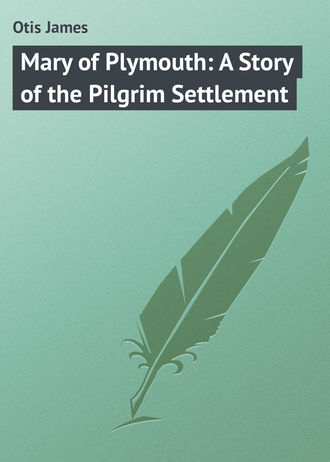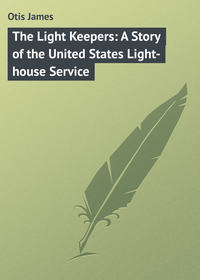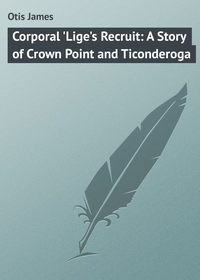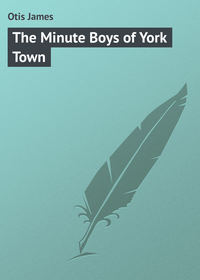 полная версия
полная версияMary of Plymouth: A Story of the Pilgrim Settlement
A CHIMNEY WITHOUT BRICKS
I had almost forgotten to tell you how father built a chimney without either bricks or mortar, for of course we had none of those things when we first made our village.
Our chimney is of logs plastered plentifully with clay, and fastened to the outside of the building, with a hole cut through the side of the house that the fireplace may be joined to it.
The fireplace itself is built of clay, made into walls as one would lay up bricks, and held firmly together by being mixed with dried beach grass.
It looks somewhat like a large, square box, open in front, and with sides and ends at least two feet thick. It is so large that Sarah and I might stand inside, if so be the heat from the fire was not too great, and look straight out through it at the sky.
Father drags in, as if he were a horse, logs which are much larger around than is my body, and mother, or one of the neighbors, helps him roll them into the big fireplace where, once aflame, they burn from one morning until another.
BUILDING THE FIRE
The greatest trouble we have, or did have during our first winter here, was in holding the fire, for the wood, having just been cut in the forest, is green, and the fire very like to desert it unless we keep close watch. Neither mother nor I can strike a spark with flint and steel as ably as can many women in the village; therefore, when, as happened four or five times, we lost our fire, one of us took a strip of green bark, or a shovel, and borrowed from whosoever of our neighbors had the brightest blaze, enough of coals to set our own hearth warm again.
Some of the housewives who are more skilled in the use of firearms than my mother or myself, kindle a blaze by flashing a little powder in the pan of a gun, allowing the flame to strike upon the tinder, and thus be carried to shavings of dry wood. It is a speedy way of getting fire; but one needs to be well used to the method, else the fingers or the face will get more of heat than does the tinder. Father cautions us against such practice, declaring that he will not allow his weapons to remain unloaded simply for kitchen use, when at any moment the need may arise for a ready bullet.
But we have in Plymouth one chimney of which even you in Scrooby might be proud.
MASTER BRADFORD'S CHIMNEY
Master Bradford built what is a perfect luxury of a chimney, which shows what a man can do who has genius, and my mother says he showed great skill in thus building. If you please, his chimney is of stone, even though we have no means of cutting rock, such as is known at Scrooby. He sought here and there for flat stones, laying them one upon another with a plentiful mixture of clay, until he built a chimney which cannot be injured by fire, and yet is even larger than ours.
Its heart is so big that I am told Master Bradford himself can climb up through it without difficulty, and at the bottom, or, rather, where the fireplace ends and the chimney begins, is a shelf on either side, across which is laid a bar of green wood lest it burn too quickly; on this the pot-hooks and pot-claws may be hung by chains.
It would seem as if all this had made Master Bradford over vain, for because the wooden bar, which he calls a backbar, has been burned through twice, thereby spoiling the dinner, he has sent to England for an iron one, and when it comes his family may be proud indeed, for only think how easily one can cook when there are so many conveniences!
We are forced to put our pots and pans directly on the coals, and it burns one's hands terribly at times, if the fire is too bright. Besides, the cinders fall on the bread of meal, which causes much delay in the eating, because so much time is necessary in scraping them off, and even at the best, I often get more of ashes than is pleasant to the taste.
Bread of any kind is such a rarity with us that we can ill afford to have it spoiled by ashes. During the first two years we had only the meal from Indian corn with which to make it; but when we were able to raise rye, it was mixed with the other, and we had a most wholesome bread, even though it was exceeding dark in color.
SCARCITY OF FOOD
In Scrooby one thinks that he must have bread of some kind for breakfast; but we here in Plymouth have instead of wheaten loaves, pudding made of ground Indian corn, sometimes sweetened, but more often only salted, and with it alone we satisfy our hunger during at least two out of the three meals. I can remember of two seasons when all the food we had for more than three months, was this same hasty pudding, as we soon learned to call it.
That first winter we spent here was so dreadful and so long that I do not like even to think of it. Nearly all the food we had brought from England was spoiled before we came ashore.
There were many times when Sarah and I were so hungry that we cried, with our arms around each other's neck, as if being so close together would still the terrible feeling in our stomachs.
All the men who were able to walk went hunting; but at one time, before the warm weather came again, only five men were well enough to tramp through the forest, and these five had, in addition, to chop wood for the whole village.
Mother and the other women who were not on beds of sickness, went from house to house, doing what they might for those who were ill, while we children were sent to pick up dead branches for the fires, because at times the men were not able to cut wood enough for the needs of all.
Then so many died! Each day we were told that this neighbor or that had been called to Heaven. I have heard father often say since then, that the hardest of the work during those dreadful days, was to dig graves while the earth was frozen so solidly.
Think! Fifty out of our little company of one hundred and two, Captain Standish's wife among the others, were called by God, and as each went out into the other world, we who were left on earth felt more and more keenly our helplessness and desolation.
A TIMELY GIFT
It was fortunate indeed for us that Captain Standish was among those able to labor for others, else had we come much nearer dying by starvation. A famous hunter is the captain, and one day, when I was searching for leaves of the checkerberry plant under the snow, mother having said the chewing of them might save me from feeling so hungry, Captain Standish dropped a huge wild turkey in front of me.
It seemed like a gift from God, and although it was very heavy, I dragged it home, forgetting everything except that at last we should have something to eat.
Many days afterward I heard that the captain went supperless to bed that day, and when I charged him with having given to me what he needed for himself, he laughed heartily, as if it were a rare joke, saying that old soldiers like himself had long since learned how to buckle their belts more tightly, thus causing it to seem as if their stomachs were full.
A firm friend is Captain Standish, and God was good in that he was sent with us on the Mayflower.
It was when our troubles were heaviest, that Sarah came to my home because her mother was taken sick, and Mistress Bradford, who went there to do what she might as nurse, told Sarah to stay in some other house for a time.
THE FIRST SAVAGE VISITOR
We two were standing just outside the door of my home, breaking twigs to be used for brightening the fire in the morning, when suddenly a real savage, the first I had ever seen, dressed in skins, with many feathers on his head, came into the village crying:
"Welcome English!"
Women and children, all who were able to do so, ran out to see him, the first visitor we had had in Plymouth. His skin was very much darker than ours, being almost brown, and, save for the color, one might have believed him to be a native of Scrooby dressed in outlandish fashion to take part in some revel.
Father was the more surprised because of hearing him speak in our language, than because of his odd dress; but we afterward learned that he had met, two or three years before, some English fishermen, and they had taught him a few words.
Very friendly he was, so much so that when he put his hand on my head I was not afraid, and I myself heard him talking with Master Brewster, during which conversation he spoke a great many Indian words, and some in English that I could understand.
His name was Samoset, and after he had looked around the village, seeming to be surprised at the manner in which our houses of logs were built, he went away, much to my disappointment, for I had hoped, without any reason for so doing, that he might give me a feather from the splendid headdress he wore.
As I heard afterward, he promised to come back again, and when, six days later, he did so, there was with him another Indian, one who could talk almost the same as do our people. His was a strange story, or so it seemed to me, so strange and cruel that I wondered how he could be friendly with us, as he appeared to be, because of having suffered so much at the hands of people whose skins were white.
Squanto had been a member of the same tribe that owned the land where our village of Plymouth was built, and his real name, so Governor Bradford says, is Squantum.
SQUANTO'S STORY
Seven years before the Mayflower came, he had been stolen by one Captain Hunt, who had visited these shores on a fishing voyage, and by him was sent to Spain and sold as a slave. There a good Englishman saw him and bought him of his master. He was taken to London, where he worked as a servant until an exploring party, sent out by Sir Ferdinando Gorges, was about to set sail for this country, when he was given passage.
While he had been in slavery, the dreadful sickness broke out, which killed or drove away all his people; therefore, when the poor fellow came back, he found none to welcome him.
How it was I cannot say, but in some way he wandered about until coming among the tribe of Indians called the Wampanoags, where he lived until Samoset happened to come across him.
As soon as he knew that we of Plymouth were English people, he had a desire to be friendly, because of what the good Englishman had done for him.
I have heard father say many times that but for Squanto, perhaps all of us might have died during that terrible winter when the good Lord took fifty of our company, which numbered, when we left England, but an hundred and two.
LIVING IN THE WILDERNESS
You must know that in this land everything is different from what you see in England. Of course the trees are the same; but oh, so many of them! We are living now, even after our homes have been made, in the very midst of the wilderness, and in that winter time when Squanto and Samoset came to us, bringing the corn we needed so sorely, we were much like prisoners, for the snow was piled everywhere in great drifts.
The trees, growing thickly over the ground, save where they had been cut down to build our homes and to provide us with wood for the fires, prevented all, except such of the men as were well enough to go out with their guns in the hope of shooting animals that could be eaten as food, from going abroad, save from one house to the other.
And little heart had we for leaving the shelter of our homes. In nearly every house throughout the village was there sickness or death; the cold was piercing, and, however industriously we had worked filling the cracks between the logs with clay, the wind came through in many places, so that for the greater part of the time we needed to hug closely to the fire lest we freeze to death.
There were days when it seemed indeed as if the Lord had forgotten us; when, with the hunger, and the cold, and the sickness on every hand, it was as if we had been abandoned by our Maker.
THE FRIENDLY INDIANS
With the coming of Samoset and Squanto, however, although the illness was not abated, and one after another of our company died, it seemed, perhaps only to us children, as if things were changed. These Indians were the only two persons in all the great land who were willing to take us by the hand and do whatsoever they might to cheer, and because of this show of kindness did we feel the happier.
Squanto, as father has said again and again, did very much to aid. First he showed our people how to fish, and this may seem strange to you, for the English had used hooks and lines many years before the New World was dreamed of; yet, it is true that the savages could succeed, even without proper tackle, better than did our people.
Squanto showed father how, by treading on the banks of the brooks, to force out the eels which had buried themselves in the mud during the cold weather, and then taught him how to catch them with his hands, so that many a day, when there was nothing whatsoever in our home to eat, we hunted for eels, boiling rather than frying them, because the little store of pork was no longer fit to cook with.
Another thing which Squanto did that was wondrously helpful, was to teach us how to grind this Indian corn, Guinny wheat, or Turkie wheat, which ever it should be called, for none of us seemed to know which was the right name for it. The wheat that we found among the Indian graves could be made ready for the table, as we believed, only by boiling it a full day, and then it was not pleasing to the taste. But when Squanto came, he explained that it should be pounded until it was like unto a coarse flour, when it might be made into a pudding that, eaten with salt, is almost delicious.
GRINDING THE CORN
When I heard him telling father that it must be ground, I said to myself that we were not like to know how it might taste, for there is not a single mill in this land; but Squanto first cut a large tree down, leaving the stump a full yard in height. Then, by building a fire on the stump, scraping away with a sharp rock the wood as fast as it was charred, he made a hollow like unto a hole, and so deep that one might put in half a bushel of this Turkie wheat.
From another portion of the tree he shaped a block of wood to fit exactly the hole in the stump, and this he fastened to the top of a young, slender tree, when even we children knew that he had made a mortar and pestle, although an exceeding rude one.
We had only to pull down the heavy block with all our strength upon the corn, thus bruising and crushing it, when the natural spring of the young tree would pull it up again. In this way did we grind our Guinny wheat until it was powdered so fine that it might be cooked in a few moments.
A VISIT FROM MASSASOIT
One day Samoset, Squanto, and three other savages came into our new village of Plymouth, walking very straight and putting on such appearance of importance that I followed them as they went to the very center of the settlement, for it seemed to me that something strange was about to happen, as indeed proved to be the case.
The Indians had come to tell our governor that their king, or chief, was in the forest close by, having in mind to visit the Englishmen, and asked if he should enter the village.
I was so busy looking at the feathers and skins which these messengers wore that I did not hear what reply Captain Standish made, for he it was who had been called upon by Governor Carver to make answer; but presently a great throng of savages, near sixty I was told, could be seen through the trees as they marched straight toward us.
Then my heart really stood still, as I saw Master Winslow walking out to meet them, with a pot of strong water in his hand; but Captain Standish said I need not be afraid, as he was only going to greet the chief of the Indians, carrying the strong water, three knives, a copper chain, an earring, and somewhat in the way of food.
It seemed like woeful waste to give that which was of so much value to a savage, but Captain Standish said it would be well if we could gain the favor of this powerful Indian even at the expense of all the most precious of our belongings.
A brave show did the savages make as they came into the village, marching one after the other! The feathers were of every color, and in such quantity it seemed as if all the birds in the world could not yield so many, even though every one was plucked naked. And the furs! The chief, whose name is Massasoit, wore over his shoulders a mantle so long that it dragged on the snow behind him, and he had belts and chains of what looked to be beads; but Captain Standish told me it was what the Indians called wampum, and served them in the place of money.
Governor Carver stood at the door of Elder Brewster's house, which as yet had no roof, and beckoned for the chief and those who followed him, to enter. Inside were Mistress Carver's rug and mother's two cushions, which had been laid on the ground for the savage to sit on, and greatly did I fear that all those precious things would be spoiled before the visit was come to an end.
I cannot tell you what was said or done, for neither Sarah nor I could get inside Master Brewster's house, so crowded was it with the men of our village and with savages. More than half of those who had come with the chief were forced to remain outside, because of there not being space for all within the walls. Sarah and I had our fill of looking at them; but never one gave the slightest attention to us. It seemed much as if they believed their station was so high that it would be beneath their dignity to speak with children.
MASSASOIT'S PROMISE
The savages and our people were long in the half-built house, and both Sarah and I wondered what could be going on to take up so much time, more especially since we knew that, of the Indians, only Samoset and Squanto could speak in English. Later we came to understand that this chief, Massasoit, was making a bargain with the men of Plymouth.
My father called it a treaty, which, so mother explained to me, is the same as an agreement between two nations.
Massasoit, being the ruler over all the Indians nearby our village, promised that neither he nor any of his tribe should do any manner of harm to us of Plymouth; but if any wicked ones did work mischief, they should be sent to our governor to be punished.
He promised also that if anything was stolen by his people from us, he would make sure it was sent back, and if, which is by no means likely, any of us living in Plymouth took from the Indians aught of their property, our governor should send it straightway to the savages.
Massasoit said that if any Indians came to fight or kill our people, he would send some of his men to help us, and if any tried to hurt his people, our fathers must take sides with him. Both Sarah and I think this is wrong, for why should Englishmen fight for the savages?
It seems to me much as if the white men should not agree to go to war with any except those who try to kill us; but father said it was no more than a fair trade.
All this was agreed to while Elder Brewster's house was so full of visitors and our people, that they must have been packed together like herring in a box, and when the bargain, or treaty, had been made, all the savages, except Samoset and Squanto, marched away.
Soon after Massasoit had gone, his brother, Quadequina, and several more Indians appeared, and we entertained them also.
It was much like a feast day, to have so many people in this new village of ours that all the space beneath the trees seemed to be crowded, and we felt quite lonely when our fathers took up once more the work of building houses.
MASSASOIT'S VISIT RETURNED
Next day Captain Standish and Master Allerton went to call upon Massasoit, and I was so frightened that I trembled when they marched away, for it seemed to me as if some harm would be done them in the savage village.
They came back at nightfall, none the worse for having been so venturesome, and what do you think they brought as a present from the chief? A few handfuls of nuts such as grow in the ground, and many leaves of a plant called tobacco, which these savages burn in a queer little stone vessel at the end of a long, hollow reed, by putting the reed in their mouths, and sucking the smoke through to keep the herb alight.
This ended our round of pleasure, the first we had had for many a long day, and once more we trembled before the sickness which was destroying so many of our people.
THE BIG HOUSE BURNED
It was yet winter when we met with a sad loss, for the Common House, as we called it, when speaking of that first building which was put up that all of us might have a shelter on shore while the dwellings were being built, took fire, and much of it was burned. Father believes that the logs in the fireplace had been piled too high, because of the weather's being so very cold, and thus the flames came directly upon the chimney and the backbar, kindling all into a blaze.
It was most mournful to see next morning, the blackened, smoldering logs of our first house which had served as a shelter less than one month, and mother says it was a warning to us that even our own homes are in danger of being speedily destroyed, unless the chimneys can be so built as to resist fire.
THE "MAYFLOWER" LEAVES PORT
All was excitement in this little village when our people began to make ready for sending the Mayflower home. She had been lying at anchor close by the shore, giving shelter to them as were yet without homes, and affording a timely place of refuge when the Common House was partly burned; but our fathers had decided that she could no longer be kept idle. It was much like breaking the last ties which bound us to the old homes in England, when the time had been set for her to go back.
Sarah and I could have no part in making the Mayflower ready for sailing, since we were only two girls who were of no service or aid; but we watched the sailors as they came and went from the shore, wishing, oh so fervently! that we and those we loved might remain in the vessel which had brought us so safely across the wide ocean.
During such time as we were forced to remain on board of her because of having no other place of shelter, she seemed all too small for our comfort, and we rejoiced at being able to leave her; but when it was known that she was going back to our old homes, where were all our friends, save those who had come to this new world with us, it was much like starting anew.
Sarah and I stood with our arms around each other as she sailed out of the harbor, while all the people were gathered on the shore to wish her a safe voyage, and I know that my cheeks were wet with tears as I saw her disappearing in the east, leaving us behind.
That night father prayed most fervently for all on board, that they might have a safe and speedy passage, and it was to me as if I had parted at the mouth of the grave with some one who was very dear to me.
Then were we indeed alone amid the huge trees, surrounded by wild beasts and savage Indians, and the sickness was yet so great among us, that I wondered if God had really forgotten that we had come to this new world in order to worship him as we had been commanded?
SETTING THE TABLE
I often ask myself what you of Scrooby would say could you see us at dinner. We have no table, and boards are very scarce and high in price here in this new village of ours, therefore father saved carefully the top of one of our packing boxes, while nearly all in the settlement did much the same, and these we call table boards.
When it is time to serve the meal, mother and I lay this board across two short logs; but we cover it with the linen brought from the old home, and none in the plantation, not even the governor himself, has better, as you well know.
I would we had more dishes; but they are costly, as even you at home know. Yet our table looks very inviting when it is spread for a feast, say at such times as Elder Brewster comes.
We have three trencher bowls, and another larger one in which all the food is placed. Then, in addition to the wooden cups we brought from home, are many vessels of gourds that we have raised in the garden, and father has fashioned a mold for making spoons, so that now our pewter ware, when grown old with service, can be melted down into spoons until we have a goodly abundance of them.









